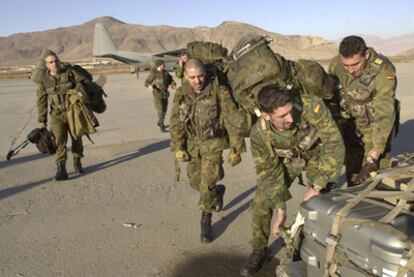Spain will start to withdraw troops from Afghanistan in the first half of 2012
For the first time, President Rodríguez Zapatero explains Spain's departure calendar
President José Luis Rodríguez Zapatero revealed on Friday that Spain will begin the process of leaving Afghanistan in the first six months of 2012.The withdrawal of the 1,500-strong contingent will be gradual and progressive. Around 10 percent of Spain's troops (155 soldiers) will leave Afghanistan in the first six months of 2012; up to 40 percent (620 soldiers) will follow one year later; and the remainder will depart in 2014, when NATO's current mission in Afghanistan is due to end.
There could be an extended yet limited presence of military advisors after that, under the protection of a long-term cooperation agreement with the government in Kabul. The rhythm of departure will depend on security improvements on the ground, and will be checked as Spain increasingly hands over control to Afghan troops.
According to the Efe news agency, the process of transferring responsibilities to local authorities will begin this summer in the Afghan province of Herat. Starting next month, the Spanish contingent of about 500 soldiers in Herat will come together with the 1,000 troops currently stationed in Badghis.
Last Wednesday, in Senate corridors, Spain's Defense Minister Carme Chacón ruled out reducing the Spanish contingent this year and added that, far from retreating, "when we start to transfer powers to the authorities in Herat, we will redeploy forces to the north, to Badghis, because that is where we need them the most."
If Spain cannot start now the withdrawal of its troops, as France and other countries are doing, it is not due to lack of will, but because the process is slower in Badghis than elsewhere. That is so because Spanish soldiers have been mostly stationed in the capital, Qala-i-Naw, whereas insurgents have made their presence felt in the rest of the province. It is also because it is one of the most backward regions of the country, where there has never been anything akin to an Afghan state.

Tu suscripción se está usando en otro dispositivo
¿Quieres añadir otro usuario a tu suscripción?
Si continúas leyendo en este dispositivo, no se podrá leer en el otro.
FlechaTu suscripción se está usando en otro dispositivo y solo puedes acceder a EL PAÍS desde un dispositivo a la vez.
Si quieres compartir tu cuenta, cambia tu suscripción a la modalidad Premium, así podrás añadir otro usuario. Cada uno accederá con su propia cuenta de email, lo que os permitirá personalizar vuestra experiencia en EL PAÍS.
¿Tienes una suscripción de empresa? Accede aquí para contratar más cuentas.
En el caso de no saber quién está usando tu cuenta, te recomendamos cambiar tu contraseña aquí.
Si decides continuar compartiendo tu cuenta, este mensaje se mostrará en tu dispositivo y en el de la otra persona que está usando tu cuenta de forma indefinida, afectando a tu experiencia de lectura. Puedes consultar aquí los términos y condiciones de la suscripción digital.








































